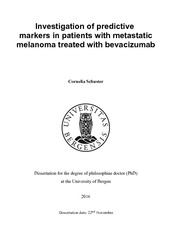| dc.contributor.author | Schuster, Cornelia | en_US |
| dc.date.accessioned | 2017-03-03T09:36:23Z | |
| dc.date.available | 2017-03-03T09:36:23Z | |
| dc.date.issued | 2016-11-22 | |
| dc.identifier.isbn | 978-82-308-3194-6 | en_US |
| dc.identifier.uri | https://hdl.handle.net/1956/15572 | |
| dc.description.abstract | Background: The incidence of malignant melanoma is still rising among fair- skinned people worldwide, and it is among the three major cancer types in young adults in Norway. Progression free survival and overall survival have improved for metastatic melanoma, but there is still a need to improve treatment options. Only about 50% of the melanomas are BRAF mutated and not all patients are eligible to immunotherapy or respond to this kind of treatment. Therefore, further treatment options and validated predictive markers needs to be investigated. Purpose: This PhD project is based on a clinical Phase II trial that investigated efficacy and safety of bevacizumab monotherapy in patients with metastatic melanoma. Based on the encouraging results of a disease control rate of 31%, we wanted to investigate predictive markers in tissues and blood samples. Material and Methods: 35 patients with metastatic melanoma in progression were included in this clinical Phase II trial conducted at Haukeland University Hospital. Bevacizumab was given in a dosage of 10mg/kg every second week until disease progression or unacceptable toxicity. Blood pressure was monitored at every treatment cycle. The primary endpoint was objective response (OR) including patients with complete response (CR) or partial response (PR) according to RECIST guidelines as well as disease control (DC) including patients with stable disease (SD) for more than 6 months in addition. Tissues from primary tumors and metastases as well as blood samples were collected. BRAF and NRAS mutation status was assessed (Paper I). In this work, we focused on investigations in serum and plasma samples taken before treatment with bevacizumab was started. We performed immunohistochemical staining of whole tissue sections from primary melanomas and metastases. Based on pre-specified hypotheses, we investigated the angiogenesis-related markers VEGF-A, its splicing variant VEGF-A165b, bFGF and HSP27 (Paper II). Microvessel density, the number of proliferating vessels and the presence of glomeruloid proliferations (GMPs) were also assessed in tissue samples. In addition, we analysed serum concentrations of VEGF-A, bFGF and HSP27 by ELISA (Paper II). Furthermore, we investigated 60 angiogenesis-related proteins in serum samples by a multiplex array. Unsupervised hierarchical clustering as well as supervised analysis for particular proteins were performed. Candidate proteins that were associated with response to treatment were further validated by immunohistochemistry and ELISA (Paper III). Results: 6/35 patients had objective response (OR) to treatment with bevacizumab monotherapy and 5 more patients had stable disease, resulting in a disease control (DC) rate of 31%. Responses were observed independently of BRAF and NRAS mutation status. Development of early hypertension was associated with a better DC-rate and may serve as a clinical predictive marker (Paper I). Strong expression of HSP27 in metastases was associated with objective response to bevacizumabmonotherapy. Strong expression of VEGF-A was associated with a higher number of proliferating vessels in primary melanomas and with a higher number of microvessels in metastases. However, microvessel density, the number of proliferating vessels or presence of GMPs in metastases were not associated with response to treatment. Serum concentration of VEGF-A, bFGF and HSP27 could not predict treatment response (Paper II). Unsupervised hierarchical clustering of serum concentrations assessed by the multiplex array did not show any specific pattern. Proteins with a defined fold change difference between responders and non-responders were further investigated by specific analysis. Low serum concentration of Activin A as well as high serum concentrations of IL1b, uPAR and VEGF-A were associated with objective response to bevacizumab monotherapy. Single protein ELISA was performed for these candidate proteins but could not confirm the results from the multiplex array. However, strong expression by immunohistochemistry of Activin A, IL1b and uPAR in tumor cells from metastases was associated with objective response to bevacizumab monotherapy (Paper III). Conclusions: Treatment with bevacizumab monotherapy showed promising efficacy in patients with metastatic malignant melanoma in progression. Development of early hypertension may be a potential clinical predictor. We identified strong expression of HSP27, Activin A, IL1b and uPAR in metastases as possible predictive markers. Since our results are based on a single-arm trial with limited sample size, they have to be interpreted carefully. Validation in a larger randomized trial has to be performed. | en_US |
| dc.language.iso | eng | eng |
| dc.publisher | The University of Bergen | eng |
| dc.relation.haspart | Paper I. Cornelia Schuster, Hans P. Eikesdal, Hanne Puntervoll, Juergen Geisler, Stephanie Geisler, Daniel Heinrich, Anders Molven, Per E. Lønning, Lars A. Akslen, Oddbjørn Straume. Clinical efficacy and safety of bevacizumab monotherapy in patients with metastatic melanoma: predictive importance of induced early hypertension. PLoS One. 2012;7(6):e38364. <a href="http://hdl.handle.net/1956/6486" target="blank">http://hdl.handle.net/1956/6486</a> | en_US |
| dc.relation.haspart | Paper II: Cornelia Schuster, Lars A. Akslen, Oddbjørn Straume. Expression of Heat Shock Protein 27 in Melanoma Metastases is Associated with Overall Response to Bevacizumab Monotherapy: Analyses of Predictive Markers in a Clinical Phase II Study. PLoS One. 2016; 11(5):e0155242. <a href="http://hdl.handle.net/1956/15573" target="blank">http://hdl.handle.net/1956/15573</a> | en_US |
| dc.relation.haspart | Paper III. Cornelia Schuster, Tomasz Stokowy, Lars A. Akslen, Oddbjørn Straume. The predictive value of angiogenic proteins in serum samples from patients with metastatic melanoma treated with bevacizumab monotherapy. (Manuscript submitted). Full-text not available. | en_US |
| dc.title | Investigation of predictive markers in patients with metastatic melanoma treated with bevacizumab | en_US |
| dc.type | Doctoral thesis | |
| dc.rights.holder | Copyright the author. All rights reserved. | |
| dc.subject.nsi | VDP::Medisinske Fag: 700 | en_US |
